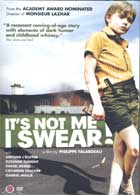
It’s Not Me, I Swear! (C’est Pas Moi, Je Le Jure!) 2008
Distributed by First Run Features, 630 Ninth Avenue, Suite 1213, New York, NY 10036; 212-243-0600
Producer n/a
Directed by Phillipe Flardeau
DVD, color, 110 min., French with English subtitles
General Adult
Children, Divorce, Drama, Family, Parenting
Date Entered: 06/24/2014
Reviewed by Linda Frederiksen, Washington State University, Vancouver, WALéon Doré is a precocious 10-year old not like most kids his age. It’s the summer of 1968 and while nearly everyone in his suburban middle-class neighborhood is packing up the station wagon for a 3-week camping vacation, Léon is at home watching his own dysfunctional family disintegrate. The story begins with Léon trying to hang himself in his front yard. He is rescued but it is neither his first or last ‘accidental’ suicide attempt. When his mercurial mother abandons her suffocating bourgeois life for Greece, an escalating series of crimes and cries for attention, including lying, minor and major vandalism, arson, theft, and running away follow. After school resumes in the fall, Léon’s emotional state continues to deteriorate. His older brother and father only wish for normality but that is not the path Léon, or his troubled young friend Léa, seem capable of following.
There are some funny moments, as when Léon’s gets glasses, and the story is told with a gentle touch. Léon’s rebellious acts, however, can’t mask his profound sadness, anger and loss of innocence. Directed by Philippe Falardeau (Monsieur Lazhar), the cast and particularly Antoine L'Écuyer, the young actor who plays Léon, is exceptional. Adapted from two novels by French-Canadian author Bruno Hébert, the cinematography is outstanding, with nostalgically accurate set design and costumes. The film has received the numerous awards, including best feature at the 2009 Berlin International Film Festival. It is recommended for general adult and young adult audiences, especially those who enjoyed the 1971 Hal Ashby cult classic Harold and Maude.